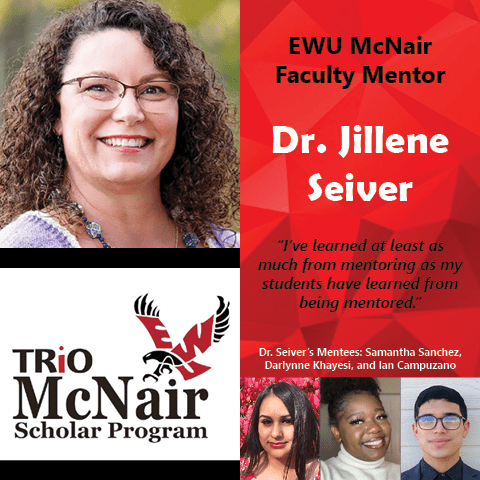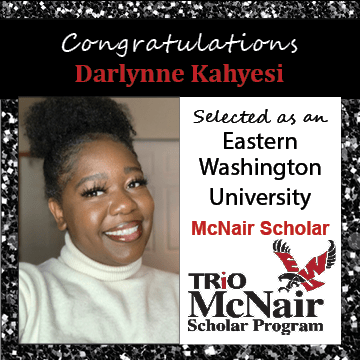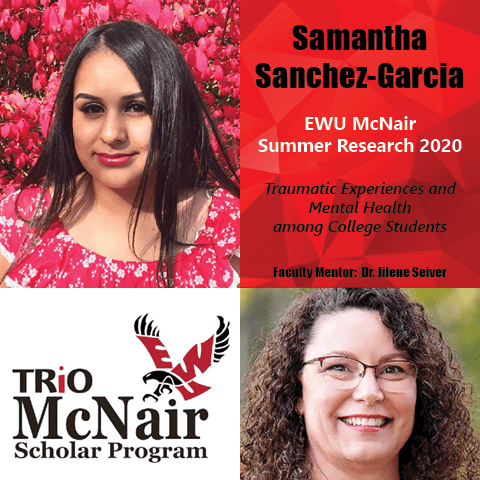
EWU McNair Faculty Mentor Spotlight: Dr. Jillene Seiver
by Cori Jaeger, EWU McNair Program Academic Advisor
Senior Lecturer Dr. Jillene Seiver first became involved with McNair in 2020. After teaching Psychology 100 to College Assistance Migrant Program (CAMP) students, one of those students EWU McNair alumna Samantha Sanchez-Garcia – approached Dr. Seiver to be her faculty mentor. Dr. Seiver accepted the role with enthusiasm. The EWU McNair faculty mentor’s goal is to support scholars in conducting their EWU McNair Summer Research Internship and moving towards their goal of becoming graduate students. Dr. Seiver guided Samantha through the Institutional Review Board (IRB) process, which approves, monitors, and reviews research involving human subjects, so that Samantha could conduct a survey and use the findings to better understand trauma and its impact on the mental health of college students.
Samantha presented her research at the Baylor McNair Research Conference and at the Western Psychological Association conference. She also applied to over ten graduate programs. After being accepted by three programs, Samantha decided to attend the Industrial and Organizational Psychology PhD Program at Depaul University where she was selected as one of just three students out of 80 applicants! Not only do McNair faculty mentors provide invaluable support and graduate school preparation through research, they are such meaningful connections for scholar that they often forge life-long collegiate relationships. When I interviewed Dr. Seiver in early October, Samantha had already been in touch with her to check-in regarding the experience so far at DePaul.
Dr. Seiver had heard about the McNair program previously from Dr. Kayleen Islam-Zwart, the Chair of the School of Psychology, who mentored EWU McNair alumna Rachel Silverthorn in 2019-2020 and Acea Sands in 2017. In fact, EWU McNair has had over ten mentors from the Psychology department in the last twenty years! Dr. Seiver noted that in the absence of graduate students, in addition to the joy of mentoring, it’s been really helpful to have engaged students to support her research:
McNair students are similar to grad students in their desire and ability to get the work done.”
She sees mentoring as a part of her work as faculty and as a way to give back to the community – to prepare the next generation of psychology researchers. When I asked why she would recommend mentoring to other faculty she said:
McNair may well introduce you to students who you haven’t really connected with prior. Whether they were busy working or were a bit more shy in approaching faculty, you didn’t see them and yet they have all of this potential. I got as much out of the experience as I think my scholars did. I learned a lot.”
She sees McNair as an opportunity to help talented young people by providing the support and lift they need to be successful in graduate school.
EWU McNair faculty mentors do so much for their scholars even beyond the research experience-such as having meaningful conversations, sharing insight into academia, offering feedback on applications and research writing, and writing letters of recommendation-and yet Dr. Seiver found the workload was not overwhelming. In fact, for the 2021 Summer Research Internship, Dr. Seiver took on two mentees: Darlynne Khayesi and Ian Campuzano. She met with students weekly, directing them towards articles, discussing research, and outlining the steps they needed to take. She pointed out, “It’s not your project; your job is to facilitate the student generating and carrying through their own project.” This aligns with what EWU McNair alumnus Dr. Frank King said in his interview for our Social Justice in Research panel at the EWU CSTEM and McNair Symposium June 2021:

Remember that it is the student’s project. We have to find a way to help the student find their voice. We can challenge them. But we have to let them find their way.” – EWU McNair Alumnus Dr. Frank C. King Jr.
I met with all of our McNair Scholars regularly during the summer and both Ian and Darlynne noted Dr. Seiver provided a clear process they could follow to research their specific interests and that she was always there for them when they had a question or a difficulty. All in all, Dr. Seiver spent an hour or two a week to support each student throughout summer quarter, with an exception of a bit more time when helping students analyze data through methods they have not been introduced to yet as undergrads. Both students’ projects have continued into the fall as they finished collecting surveys and finalizing their research papers. Dr. Seiver continues to be available to her students so they have whatever support is needed to finish their projects. While mentors do often review and support mentees in developing their research papers, Dr. Seiver said the McNair program also helps students know what to do and how to do it, so it is not all on the mentor. We also connect students with the Writer’s Center for additional support. Once their research papers are finished, students can submit them as an example of academic writing with their graduate school applications, most often alongside a strong letter of recommendation from their mentor. Both of these elements are a large part of what makes McNair Scholars competitive, in particular if they go directly from undergraduate school to a PhD program.
It is clear through her generous support of McNair Scholars that Dr. Seiver is committed to serving Eastern students. McNair is deeply appreciative of Dr. Seiver and all of our EWU McNair faculty mentors. Without them, this work would not be possible. Mentor support and encouragement is crucial to McNair Scholars’ belief that they belong in academia as well as their acceptance into graduate school and ultimate success in achieving their PhD’s. To date, over 41 EWU McNair Scholars have earned their PhD’s since its inception in 1995. We are grateful to Dr. Seiver for continuing the tradition of great faculty support of McNair Scholars and hope to continue to work with her and many other faculty in the years to come.




